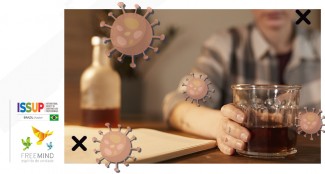Alcohol and Immunity: Drinking can affect the body's defense

Abuse of alcoholic beverages can weaken the immune system and leave the body more exposed to diseases.
Staying healthy and adopting habits that strengthen immunity are recommendations of health professionals since the beginning of the pandemic of the new coronavirus - being important measures for the body to be better prepared if it comes into contact with the virus. In this context, alcohol abuse becomes a relevant point of attention.
According to several studies, excessive alcohol consumption can weaken our immune system, making the body an easier target for diseases. This is because defense cells are affected by over-drinking.
Impact of alcohol on immunity
Chronic and heavy use of this substance reduces the number of peripheral T lymphocytes and also seems to cause the loss of peripheral B lymphocytes - both related to the body's defense and which play an important role in the recognition and destruction of infectious organisms such as bacteria and viruses.
These changes end up compromising the ability to respond to pathogens (disease-causing agents) and contributing to increased susceptibility to infections, including viral infections, such as COVID-19.
Other studies also suggest that the harmful use of alcohol affects pulmonary defense systems, causing changes in the immune function of local cells. It could also weaken epithelial barriers in the lower airways and lead to lung and respiratory problems such as tuberculosis, acute respiratory distress syndrome (ARDS) and pneumonia - which is even more severe in this pandemic period.
According to the National Institute on Alcohol Abuse and Alcoholism (NIAAA), a world reference in the subject, chronic abusive drinkers are more likely to contract diseases such as pneumonia and tuberculosis than people who do not drink abusively.
Although research explores the damage associated with heavy alcohol use, especially chronically, it is necessary to make a warning: drinking too much on a single occasion - known as Heavy Episodic Drinking (BPE)* - also decreases the body's ability to avoid infections up to 24 hours after consumption.
Alcohol consumption in quarantine
This alert makes sense especially in times of quarantine, when the increase in alcohol consumption was reported by 18% of respondents in the ConVid survey, conducted by the Oswaldo Cruz Foundation (Fiocruz), in partnership with the Federal University of Minas Gerais and the State University of Campinas.
Associated with the frequency of feeling anxious or depressed, this growth had a higher record among people aged 30 to 39 years (26%). And the use of alcohol as a tool to deal with sadness, stress or anxiety in this period is dangerous.
Finally, it is important to reinforce that the effects of alcohol on health are influenced by several individual factors (genetic vulnerability, physical structure, gender, age, health condition, among others) and also according to different aspects of drinking (quantity, frequency, pattern of consumption). But exceeding low-risk consumption limits is always an unnecessary health threat that we must avoid - regardless of pandemic.
*BPE: consumption of 60g or more of pure alcohol (about 4 doses or more) on at least one occasion in the last month. A standard dose is equivalent to 14g of pure alcohol, which corresponds to 350mL of beer (5% of alcohol), 150mL of wine (12% of alcohol) or 45mL of distillate (vodka, whiskey, cachaça, gin, tequila, with 40% alcohol).